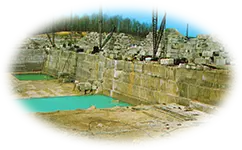
Indiana Limestone is considered to be the highest quality limestone quarried in the United States and not surprisingly it was used in the construction of some of Terre Haute's, indeed, the nation's, most prestigious buildings. The main source of the limestone is in the area between Bloomington and Bedford in south central Indiana, which gives the stone its other common name of Bedford Limestone though its more correct name is Salem limestone.
Salem limestone, like all limestone, is a rock primarily formed of calcium carbonate. The limestone was deposited over millions of years as marine fossils decomposed at the bottom of a shallow inland sea which covered most of the present-day Midwestern United States during the Early Carboniferous or Mississippian Period which lasted for 40 million years, from 359 to 318 million years ago.
Although used by Native Americans and early settlers, the first large scale quarrying started in 1827, and by 1929, 340,000 cubic metres (12 million cubic feet) were being extracted. Salem limestone was officially designated as the "state stone" of Indiana by the Indiana General Assembly in 1971. Nowadays, nearly 76,500 cubic metres (2.7 million cubic feet) of Indiana Limestone is quarried each year generating about $26 million annually in revenue.
The limestone deposit is approximately 45 miles long, between 2 and 14 miles wide and between 25 and 100 feet thick. This means that there are approximately 19,000 million cubic metres (660,000 milliom cubic feet) in the deposit, which at a density of 2,306 kg per cubic metre (144 lbs per cubic foot) is equal to 44,000 million metric tons, also spelled tonnes, (48,000,000 million short tons (2,000 lbs) or 43,000 million long tons (2,240 lbs)). At the current rate of extraction the deposit should last around 250,000 years!
In 1926, twenty-four limestone companies merged which resulted in the formation of the huge Indiana Limestone Company. In 1927, other mergers resulted in the formation of the Bloomington Limestone Company (BLC).

The Indiana Limestone Deposit

While collecting the Terre Haute postcards I have come across several fine postcards of the quarrying of Indiana Limestone and these are included here as another facet of Terre Haute's architectural history.

This linen postcard was stamped in Bradford on November 9th, 1940, has the following printed text...
14
14796
Pub. by Levin Bros., Terre Haute, Ind. (EIF)
I have another copy of this postcard that was posted in Terre Haute on September 2nd, 1942.
Before I retired in August 2023, I worked in this building. A new post office was constructed in 1935 on the site of an older one which was built in 1884. In 1936, the columns, triangular entablatures and eagle sculptures from the older building were used in the construction of the Chauncey Rose Memorial in Fairbanks Park. The pictured building was purchased by Indiana State University and in 2012, was renamed to Federal Hall and is the home of the Scott College of Business.
The building is clad in limestone from the same quarry that the limestone cladding of the Empire State Building, New York came from.
Postcard Index
| Title | Page | Description |
| Pictorial Index | 2 | Thumbnails of all the postcards illustrated on th this section of site |
| Generic | 3 | Generic scenes or where the name of the quarry is unknown |
| Baltes Stone Quarry Big Four Quarry Furst & Kerber Quarry Greencastle Hoosier Quarry Hunter Brothers' Stone Company Indiana Cut Stone Company |
4 | |
| Indiana Limestone Company | 5 | Dark Hollow Quarry, Walsh Quarry, Hoadley Mill, Joiner Mill, McGrath Mill, Turning, Carving |
| McMillan's Stone Mill P. M. & B. Quarry |
6 | |
| Milling & Finishing | 7 | Scabbling Machines, P. M. & B. Stone Company Indiana Limestone Company - Joiner Mill Indiana Limestone Company - Hoadley Mill Indiana Limestone Company - McGrath Mill Indiana Limestone Company - Turning a column Indiana Limestone Company - Carving Department |
Sources & Resources
32nd Report by Indiana. Dept. of Geology and Natural Resources, Indiana. Dept. of Statistics and Geology - This publication includes the article "The Indiana Oolitic Limestone Industry in 1907" by Raymond S. Blatchley
B. G. Hoadley Quarries (Internet Archive)
Bloomington Limestone Company
Fatal Fall of Material Accident - U.S. Department of Labor, Mine Safety and Health Administration (Internet Archive)
Gazetteer of Limestone Mills of Owen, Monroe, and Lawrence Counties to 1950
Hanson Aggregates (Marshall Historical Society)
History of the Lawrence and Monroe Counties, Indiana - by B. F. Bowen & Co., 1914
Indiana Limestone (Brooklyn College)
Indiana Limestone (Wikipedia)
Indiana Limestone: A History (YouTube Video)
Indiana Limestone Architectural Stone Carving and Cutting
Indiana Limestone Photograph Collection (Indiana University)
Indiana Oolitic Limestone - a fascinating article on "Geology, Quarries, Methods" from Stone Quarries and Beyond
Marengo Warehouse (Wikipedia)
Monroe County Government Documents - A great collection of documents and photographs
Philip Kearney Buskirk (Internet Archive)
Quarries and Mills (1929)
Quarry Districts Along the Monon
Stone Quarries and Beyond - Some great resource links
Stone Quarries and Beyond Continues - Some great resource links
The Salem Limestone in the Indiana Building-Stone District by John B. Patton and Donald D. Carr (1982)
The Ubiquitous Hoadleys: A Legacy in Limestone by Clay W. Stuckey
Upper and Middle Mississippian Formations of Southern Indiana (Indiana University)
What Is Indiana Limestone